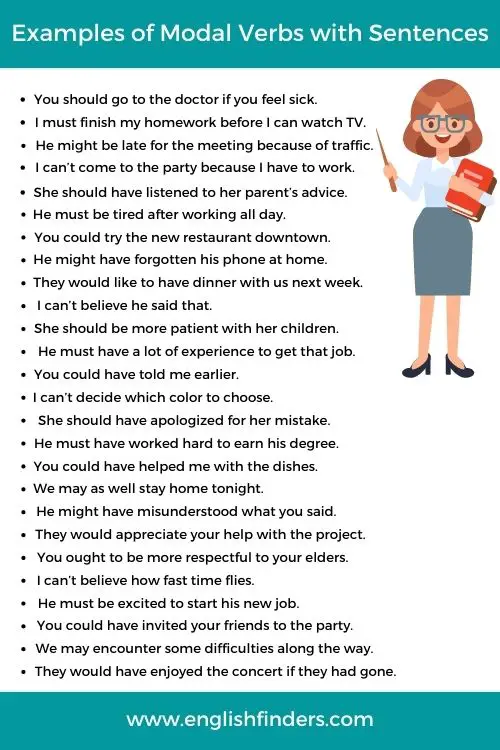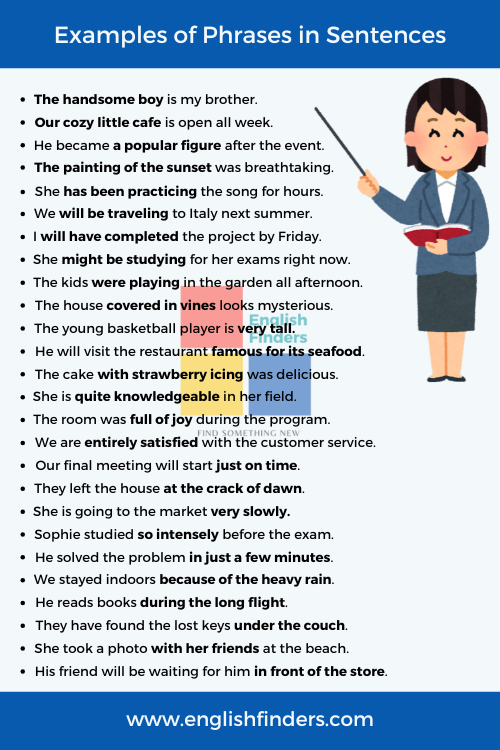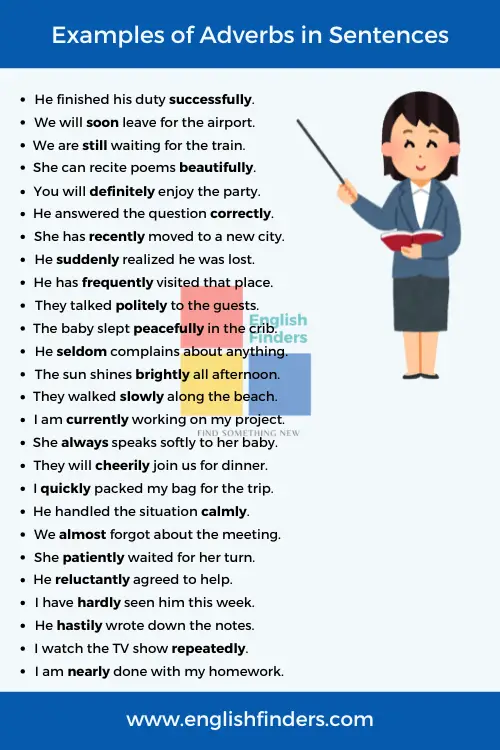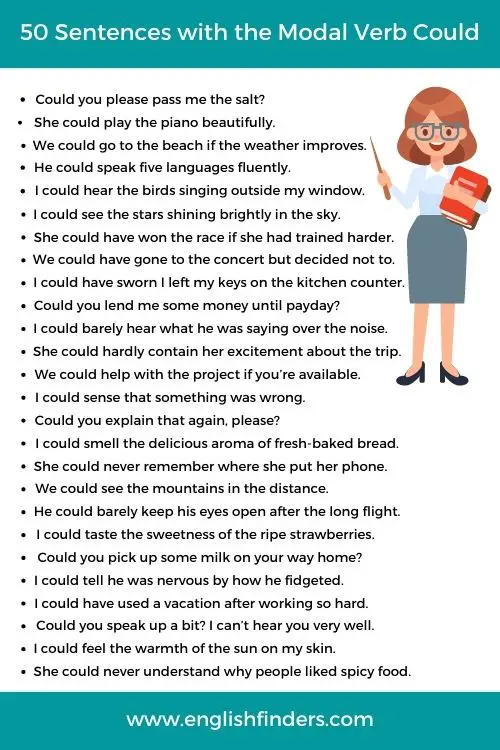Last updated on April 23rd, 2025 at 10:22 pm
Modal verbs are an essential part of the English language. They help us express our opinions, give advice, make requests, and much more. For example, saying “I can play baseball” shows ability, while “You must take the job seriously” indicates necessity. Understanding these verbs is crucial for clear and effective communication in English. In this article, we will provide you with 100 examples of modal verbs in sentences.
What are Modal Verbs?
Quick Navigation
Modal verbs are kinds of auxiliary or helping verbs that show possibility, necessity, ability, obligation, suggestion, etc. Sometimes using modal verbs can be tricky, but we can use them easily by following some tricks. Some common modal verbs are:
- Can
- Could
- May
- Might
- Must
- Shall
- Should
- Will
- Would
The Common Use of Modal Verbs
Let’s see how we can use modal verbs in our everyday situations.
- Can: Expresses ability or possibility.
- Could: Expresses past ability or polite requests.
- May: Indicates permission or possibility.
- Might: Suggests a lower possibility than “may.
- Must: Denotes obligation or necessity.
- Shall: Often used in formal settings for offers or suggestions.
- Should: Gives advice or recommendations.
- Will: Expresses future intentions or promises.
- Would: Use for polite requests or hypothetical situations.
- Ought to: Used to recommend or suggest something.
100 Examples of Modal Verbs with Sentences
Ready to see modal verbs in action? Here’s a list of 100 examples of modal verbs with sentences. We’ve grouped them by each modal verb to help you understand their use more clearly.
🔹 Can (Ability, Permission)
- I can ride a bicycle.
- She can speak three languages.
- Can I go to the bathroom?
- You can borrow my pen.
- He can solve difficult math problems.
- Can they come with us?
- We can finish the project today.
- Can you help me with my homework?
- You can call me later.
- She can cook really well.
🔹 Could (Past Ability, Polite Requests)
- I could read when I was four.
- She could run fast in school.
- Could you pass the salt, please?
- Could I ask you something?
- He could play the guitar at a young age.
- Could we meet tomorrow?
- I could hear the music from next door.
- Could you help me carry this bag?
- Could she join us for dinner?
- I could never lie to my best friend.
🔹 May (Permission, Possibility)
- May I use your phone?
- You may go now.
- It may rain this afternoon.
- He may be at the library.
- May we take a break?
- I may visit my cousin this weekend.
- You may not enter the room.
- She may know the answer.
- May I ask a question?
- They may arrive late.
🔹 Might (Possibility)
- I might go to the party.
- He might not come today.
- It might snow tomorrow.
- She might be busy right now.
- We might need more time.
- You might like this movie.
- He might be the right person for the job.
- They might visit us next week.
- I might call her later.
- She might not agree with you.
🔹 Must (Necessity, Strong Obligation)
- You must wear a seatbelt.
- We must finish this by Friday.
- He must be tired after the long trip.
- Students must bring their ID cards.
- You must not be late again.
- She must study for the test.
- Everyone must follow the rules.
- I must talk to the teacher.
- They must stay inside during the storm.
- You must be joking!
🔹 Shall (Suggestions, Offers – formal)
- Shall we go out for lunch?
- Shall I open the window?
- Shall we begin the meeting?
- Who shall take the lead?
- Shall we start now?
- Shall I call her for you?
- Shall I bring some snacks?
- What shall we do next?
- Shall we dance?
- Where shall I put this box?
🔹 Should (Advice, Recommendation)
- You should eat more vegetables.
- He should take a break.
- They should study harder.
- She should see a doctor.
- We should leave now.
- You should try this dish.
- Should I help her?
- Should we call the police?
- Students should respect their teachers.
- You should always tell the truth.
🔹 Will (Future, Promise, Willingness)
- I will help you with that.
- She will arrive at 6 PM.
- They will join us for dinner.
- We will travel next summer.
- He will call you tomorrow.
- Will you come with me?
- I will never forget this moment.
- She will do her best.
- Will they be on time?
- He will explain everything later.
🔹 Would (Politeness, Hypothetical, Habit in the Past)
- I would love a cup of tea.
- Would you like to join us?
- He would always read before bed.
- Would you help me with this?
- I would travel if I had more money.
- She would be upset if we left.
- Would they mind waiting?
- We would go to the beach every summer.
- I would never lie to you.
- Would you please be quiet?
🔹 Ought to (Moral Obligation, Advice)
- You ought to say thank you.
- He ought to be more careful.
- We ought to help the poor.
- She ought to apologize.
- They ought to respect the rules.
- You ought to visit your grandparents.
- He ought to listen more.
- You ought to get some sleep.
- We ought to take better care of nature.
- I ought to clean my room today.
Final Thoughts
Modal verbs are an essential part of the English language, allowing us to express our thoughts, opinions, and desires in a nuanced and precise manner. By using modal verbs correctly, we can communicate effectively with others and convey our intentions clearly, whether we are giving advice, making requests, or expressing our feelings.
The 100 example sentences above offer a valuable resource for English learners and native speakers alike, helping to illustrate the many different ways modal verbs can be used in everyday conversation. With practice, anyone can master using modal verbs effectively and become a more confident and articulate speaker of English.
Frequently Asked Questions
What Are Modal Auxiliary Verbs?
Modal auxiliary verbs are kinds of helping verbs used alongside main verbs to express modality, such as ability, possibility, permission, or obligation.
How Do I Know Which Modal Verb to Use?
Understanding the context and the specific meaning you want to convey will help you in choosing the appropriate modal verb.
What are the Examples of Modal Verbs?
Can, could, may, might, must, shall, should, will, and would are the common modal verbs in English.
🎯 Exercises on Modal Verbs
Let’s put your knowledge into action! Here are some fun and simple exercises to help you practice modal verbs. These activities will test your understanding and help you use them correctly in real situations.
✅ Exercise 1: Fill in the Blanks
Choose the correct modal verb to complete each sentence:
(can, should, must, may, will, would, might, could)
- You ___ finish your homework before playing.
- I ___ ride a bike when I was six.
- ___ I borrow your pencil?
- She ___ visit us next weekend.
- You ___ not talk during the test.
- ___ you like some juice?
- He ___ be at the library now.
- We ___ go to the park if it doesn’t rain.
- I ___ call you later.
- You ___ help your classmates when they need it.
✅ Exercise 2: Choose the Right Modal
Pick the best modal verb that fits the meaning of the sentence.
- (Can / Must / Might) you help me carry these books?
- We (may / should / would) wear a uniform to school.
- You (can / ought to / could) be more respectful to your elders.
- She (might / must / will) be late—there’s traffic.
- (Will / Shall / Must) we go now or wait a bit?
✅ Exercise 3: Match the Sentences
Match the sentence on the left with its correct meaning on the right.
| Sentence | Meaning |
|---|---|
| A. You must wear a helmet. | 1. Giving permission |
| B. Can I go outside? | 2. Expressing a rule or law |
| C. It might rain today. | 3. A strong possibility |
| D. You should eat healthy. | 4. Giving advice |
| E. I can play the guitar. | 5. Talking about ability |
✅ Exercise 4: Write Your Own Sentences
Use each of these modal verbs in a sentence of your own:
- Can
- Should
- Must
- Might
- Would
Example: Can – I can swim very fast.
✅ Answers to the Exercises on Modal Verbs
Let’s check how you did! Below are the correct answers to each exercise. Review your responses and see where you can improve. Keep practicing!
📝 Exercise 1: Fill in the Blanks
- should – You should finish your homework before playing.
- could – I could ride a bike when I was six.
- May – May I borrow your pencil?
- might – She might visit us next weekend.
- must – You must not talk during the test.
- Would – Would you like some juice?
- might – He might be at the library now.
- can – We can go to the park if it doesn’t rain.
- will – I will call you later.
- should – You should help your classmates when they need it.
📝 Exercise 2: Choose the Right Modal
- Can – Can you help me carry these books?
- should – We should wear a uniform to school.
- ought to – You ought to be more respectful to your elders.
- might – She might be late—there’s traffic.
- Shall – Shall we go now or wait a bit?
📝 Exercise 3: Match the Sentences
| Sentence | Meaning |
|---|---|
| A. You must wear a helmet. | 2. Expressing a rule or law |
| B. Can I go outside? | 1. Giving permission |
| C. It might rain today. | 3. A strong possibility |
| D. You should eat healthy. | 4. Giving advice |
| E. I can play the guitar. | 5. Talking about ability |
📝 Exercise 4: Sample Sentences
(Answers will vary, but here are some good examples:)
- Can – I can speak English and Spanish.
- Should – You should drink plenty of water.
- Must – You must finish your assignment today.
- Might – I might go to the mall later.
- Would – I would love to visit Paris one day.

Azizul Hakim is the founder & CEO of englishfinders.com. He is a passionate writer, English instructor, and content creator. He has completed his graduation and post-graduation in English language and literature.




